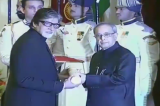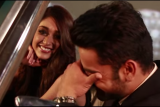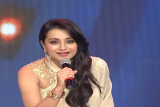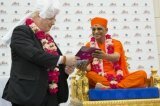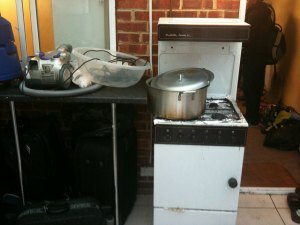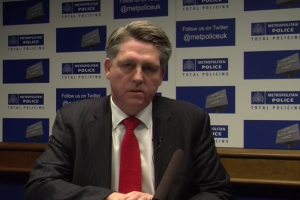Yash Chopra: Bollywood’s romance guru who is no more
That's how long Yash Chopra had been making movies. Most of his contemporaries have faded away. As have several who came after him. In an industry where it is difficult for directors to survive just one generation, Chopra has thrived for three, setting up a state-of-the-art studio under his banner, Yash Raj Films, with a widespread distribution network and boasting a roster of young directors and stars second to none.
Mostly though, he had made movies, some of them landmarks––evolving his distinctive authorial style, which many have tried to imitate but none has matched.
Yashji passed away on October 21, 2012, just weeks before the release of his 22nd feature film, Jab Tak Hai Jaan, and had just returned from a gruelling schedule in Kashmir and Ladakh. Eyewitnesses on location claim the octogenarian was on his feet throughout the shoot and proof of his commitment is in the film's recently released trailer –– every bit the work of a man who was young at heart and still conjuring rainbow-coloured dreams of picture-postcard love.
More like this
Although his name is now firmly identified with poetic romances, Chopra experimented with different genres for the first couple of decades of his career. His debut Dhool Ka Phool, for instance, was said to be ahead of its time––the story of doomed love and a child born out of wedlock which firmly put the onus of 'illegitimacy' on the parents and not the innocent offspring. In the mid-'60s, he gathered an enviable cast comprising top stars for his epic family drama, Waqt(1965), which can lay claim to being a pioneer of the 'lost and found' formula that Manmohan Desai subsequently exploited with great success. He followed it up with the two-character song-less thriller Ittefaq (1969), set entirely in a single location.
Chopra launched his banner Yashraj Films in 1971, but surprisingly, continued to direct for other producers, notably Gulshan Rai, with whom he realised two remarkable manifestations of Amitabh Bachchan's 'angry young man'––Deewar (1975) and Trishul(1978)––both written by Salim-Javed and replete with iconic dialogues and moments that aren't likely to fade from popular imagination very easily.
At a scriptwriting workshop at the National Film Archives' packed hall in Pune a couple of years ago, one of the speakers was introducing a segment on melodrama. The choice of scene for illustrating the technique was obvious––the face-off between warring brothers Vijay and Ravi under the foot over-bridge where they spent their childhood which climaxes in Ravi's emphatic parting shot, "mere paas Maa hai". The auditorium exploded with spontaneous applause that continued for several minutes as teary eyes absorbed the magic of the moment. Such is the power of Deewar.
It was with Kabhi Kabhie (1976) though that Chopra's trademark style found fruition. Unrequited love, Sahir Ludhianvi's enchanting lyrics (the title song is vintage stuff), Kashmir's virginal landscapes––a mature romantic triangle offset by another frolicky, youthful one. In subsequent decades, the ingredients may have changed but the recipe remained the same––gorgeous stars making passionate declarations of love against the backdrop of ravishing hills and brooks, and not a care in the world for anything else. Chopra took Hindi cinema to Europe (and particularly Switzerland) and it never came back.
And so he abandoned the underdog commoner of Deewar, Trishuland Mashaal (1985) for rose-tinted explorations of life on the cushy side. But regardless of the gloss and sheen, in his best work, narrative has always trumped embellishment. If Chandni (1989) was a lush upper-class romance (and the supposed class conflict in the film is actually quite silly), it was also an interesting character study of the spirited heroine, magnificently essayed by reigning queen Sridevi (don’t let the chiffon saris and the off-key singing distract from an intuitive performance). Two years later, in Lamhe, a film close to Chopra’s heart (despite its box-office failure), Sridevi excelled in a double role, as a mother-daughter duo embroiled in a complicated relationship with a tycoon (Anil Kapoor).
By the time he launched his son Aditya as director with the archetypal NRI romance [pictured] Dilwale Dulhania Le Jayenge (1995), a post-liberalisation middle class was ready for his extravagant, consumerist, globe-trotting fantasies; the overseas market comprising homesick Asians all over the world was eager to embrace his escapist fare with open arms.
The formula DDLJ established continues to this day, while the film is still showing at Mumbai’s Maratha Mandir cinema in an astonishing record of a straight 17-year run!
It was Aditya who diversified his father’s company into production. Many new filmmakers have been launched under the banner in the last decade, notably Shaad Ali, Kunal Kohli and Maneesh Sharma. Chopra himself had stepped behind the megaphone after a long hiatus of eight years for JTHJ. And the anticipation is palpable––what with a stellar crew (including Gulzar, A.R. Rahman and Anil Mehta), an A-list cast led by Shah Rukh Khan. But most of all, it's the tagline––‘A Yash Chopra Romance’.
This article was written on Yashji's 80th birthday on September 27, 2012.
Deepa Deosthalee is a film critic and a regular contributor to Cinemascope column. The views and opinions expressed in this article are those of the author and does not reflect the views or position of IndiaNewsBulletin.com. More of Deepa's work can be found on her site Film Impressions.
Most read
- 2015: Full list of Indian States, capitals and their Chief Ministers
- Indian cabinet 2014: Full list of Ministers and their portfolios in the Modi government
- Review: Southall Travel (Also Travel Trolley and Fly Sharp)
- South Indian actress Trisha Krishnan’s father passes away
- Recipe: Misal Pav – how to make missal masala, usal and tarri
- Pics: Trisha Krishnan rocks Tarun Tahiliani saree for Lion film’s audio launch in Hyderabad
- Commonwealth Games 2014: Full list of Indian gold, silver and bronze medal winners
- Lycamobile's Indian arm offers 1-rupee roaming SIM for Desi travellers
- FCNR rates comparison
- Ileana D’Cruz and Virat Kohli sizzle in TV ad for Clear anti-dandruff shampoo
India News Bulletin by email
Desi Events
Featured Stories
More Lead Stories
- Review: Southall Travel (Also Travel Trolley and Fly Sharp)
- Amitabh Bachchan honoured with Padma Vibhushan
- Long stay Indian visitors, students, professionals to pay for NHS access
- Mahatma Gandhi statue erected in London’s Parliament Square
- Pics: Deepika Padukone and Irrfan Khan’s blossoming chemistry in Piku




